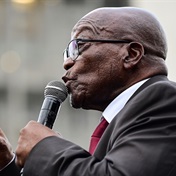The reopened land restitution process had netted 55 973 new claims by the time the minister of rural development and land reform, Gugile Nkwinti, delivered his budget address last week. That is not far from the 80 000 claims lodged before 1998 – and the new window is open until June 2019.
Last year’s Restitution of Land Rights Amendment Act has been promoted with buses kitted out as mobile claim offices on rural roadshows that raise new hope and make for good publicity ahead of next year’s local government elections.
The problem is that, while Nkwinti’s department estimates that new claims could cost R180 billion, his budget is only R2.7 billion a year. There is not nearly enough money in his budget to pay for the 28 000 unresolved old claims – let alone new ones.
What is going on here? Raising expectations that can never be fulfilled is a politically dangerous game.
President Jacob Zuma has twice encouraged members of the National House of Traditional Leaders to make consolidated tribal claims, but there is no provision in law for claims on land lost in the wars of conquest in the 1800s. Only those who lost land after 1913 are eligible for restitution.
The Restitution of Land Rights Act of 1994 and our Constitution sought to dismantle the homelands.
More than 3.5 million black South Africans were forcibly removed from their homes between 1960 and 1986. Most were dumped in resettlement camps that were subsequently incorporated into the homelands, increasing the land and revenue base of homeland leaders enormously.
Those resisting forced removals appealed to homeland leaders, including Mangosuthu Buthelezi of KwaZulu and Lucas Mangope of Bophuthatswana, but only Enos Mabuza of KaNgwane fought back. This led to the reprieve of Driefontein and KwaNgema in 1986 and ultimately to the end of the policy of forced removals.
The Communal Property Associations Act of 1996 allowed people who qualified for restitution to form democratic land-owning associations, but traditional leaders objected, saying this undermined their power and authority. They demanded that land not be returned to the people who lost it, but to the overarching “tribes” that were created in terms of the Bantu Authorities Act.
The former homelands are well known to be the poorest parts of South Africa. Ironically, however, some were later found to hold most of the country’s new mineral wealth.
The platinum belt is in the former Bophuthatswana and Lebowa. Rich deposits of iron, coal and titanium have been discovered elsewhere.
With mining licences issued only to companies with black economic empowerment (BEE) shareholders, these areas are now at the centre of a feeding frenzy by the new elite.
The initial land reform policy took a sharp about turn in 2003 from a focus on the poor and from elected structures owning restitution land.
The ill-considered Communal Land Rights Act of 2004 sought to transfer all land, including that owned by land-owning associations, to traditional leaders “on behalf of traditional communities”.
Although the land-rights act was struck down by the Constitutional Court on procedural grounds, Nkwinti continues to insist that the land must go to traditional leaders. He says ordinary people need only “institutional use rights”.
But there is a problem: the Constitution and the restitution act clearly specify that only those who had land taken from them – and then only after 1913 – are entitled to restitution.
How can government stop the settlement of outstanding valid restitution claims brought by legally constituted land-owning associations and still honour Zuma’s promises to traditional leaders?
The answer seems to be by trumping the outstanding claims by land-owning associations and trusts with counterclaims by chiefs, and by flooding the struggling restitution process so comprehensively that only cherry-picked claims get to float to the top. In the chaos that is now inevitable, the allocation of the available restitution budget will no longer be according to the law, but subject to political favour.
Recently, there has been violence at the Bokoni mine in Limpopo and at Xolobeni on the Wild Coast, where events have followed a now familiar pattern.
Mining companies win chiefs over with substantial personal benefits, while the people whose houses and fields are destroyed are neither consulted nor rewarded.
Of course, not all chiefs behave in this way, but enough do to make this a systematic problem.
Nkwinti suggested in his budget speech that land-owning association members would each get a hectare of their own. But what is a hectare compared with the much larger areas to which rural people have historical rights?
The fields, forests and grazing areas that provide food, water, thatching grass, herbs and wood that sustain people’s lifestyles are under threat from rapacious mining deals brokered by chiefs with BEE shares.
What we are seeing is dispossession dressed up as land reform. The only redistribution taking place here is from the poor to the rich.
Claassens is director of the Rural Women’s Action Research programme at the Centre for Law and Society at the University of Cape Town




 Publications
Publications
 Partners
Partners








